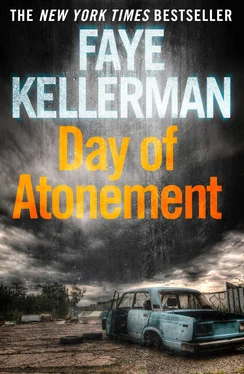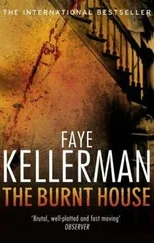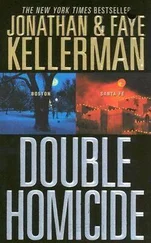Decker tightened his fists and said, “Just the library.”
“While you’re here, you should see the Grand Army Plaza. It has a very, very big arch.”
“I’ve seen loads of arches at McDonald’s.” Decker scowled.
“Oh, no,” the cabbie answered. “This one is not like that. It is much bigger. And older too.”
“I’m not interested in seeing any arch—”
“It is a very nice arch.”
Decker enunciated each word. “Just take me to the library.”
“We drive right past the arch to the library—”
“All right, show me the friggin arch!”
“Well, if you do not want to see the arch—”
“I want to see the arch,” Decker said. “In fact, I want to see the arch so badly that if I don’t see the arch, someone will pay.”
Decker looked in the rearview mirror. The cabbie’s mouth had frozen into an O. He steered the taxi by the arch, then took Decker to the library. Throughout the remaining portion of the trip, he didn’t say another word.
This was the alibi: He’d suddenly remembered an important detail to a very important case and he had to use a pay phone because it would have been a breach of ethics to let anyone else overhear him and he had to get in touch with Marge at the station house because someone’s life depended on it, well, not only someone’s life but the whole California judicial system—
Then Decker thought: Even the most complicated phone call in the world wouldn’t explain an absence of six hours. God’s judgment day around the corner and his mind was full of half-baked lies.
The night held a bitter chill, dampness oozing through his clothes and into his bones. His toes and fingers were as cold and stiff as marble. Used to the temperate zone all his life, he had blood the consistency of rubbing alcohol.
He came to the street, then the house. Lights shining through the windows, smoke undulating from the chimney. And the smells. He dreaded the people but the structure looked so damned inviting. Approaching the door, he turned up his collar, tried to mask his face as best he could. Just in case she happened to be there.
As he stepped onto the porch, he pulled his scarf over his head.
So they’d think him psychotic. Who the hell cared?
Rina swung open the door before he knocked. Her face held an expression of complete bafflement.
“Anyone home?” Decker whispered.
“Everyone’s gone to shul,” Rina said.
Crossing the threshold, Decker took the scarf off his head and pulled down his collar. He headed up the stairs, heard Rina following him. He swung open the door to the tiny bedroom and immediately stubbed his toe on the fold-out bed. Swearing, he sank down into the mattress and ran his hands across his face. The room was illuminated by a single sixty-watt table lamp that rested on the floor. The nightstand clock read six-fifty-two.
Rina sat next to him.
“Peter, you’re scaring the daylights out of me. What on earth is wrong? Did this massive dose of religion give you an anxiety attack or something?”
“Something.”
“Please, Peter,” Rina begged. “I deserve better than this—”
“What did you tell them?” Decker broke in.
“What?”
“What excuse did you make up for me when I stormed out of the house?”
“Something about your daughter … something you forgot to do for her.”
“Cindy’s a good excuse,” Decker said. “Much better than the one I’d concocted.”
Rina suddenly burst into tears. “We shouldn’t have come out here. I should have told them no.”
“Rina—”
“It’s all my fault,” she sobbed.
Decker put his arm around her and drew her near. “No, it’s not.”
“Yes, it—”
“It has nothing to do with religion,” Decker said. “It’s …” He stood, couldn’t even pace in a room this small. He said, “How are we going to sleep if we can’t turn the light off?”
“It’s on a timer,” Rina said.
Decker sat back down, stretched out on the bed, and buried his face in the blanket.
“You’re not going to tell me, are you?” Rina said.
He picked up his head, then sat up straight. “You’re right. You deserve better.” He said, “This afternoon. You were talking to a woman in the kitchen …”
“Yes?”
“She’s Frieda Levine, your mother-in-law’s best friend?”
“Yes. So what?”
He sucked in his breath. “She’s my mother.”
It took Rina a moment to assimilate what he was saying. She could only respond with a breathy what? Then she added a whispered oh my God.
“You said it,” Decker said.
“You’re sure—”
“Positive,” Decker said. “Faces are my business.”
Rina was struggling to find something to say, but all words had eluded her. All she could think of was that Peter didn’t look a thing like Frieda Levine. And she knew that was the wrong thing to say, so she remained silent.
Decker couldn’t sit any longer. He stood up and ran down the stairway, fully intending to run out the door. But he surprised himself and instead just paced the living-room carpet, further trampling the green-shag piling. The room was hot and bright, the crystal pieces giving off shards of color that splashed rainbows on the wall. As if that wasn’t enough, an illuminated three-tiered chandelier made a glitter dome out of the dining room. He felt as if he’d stepped inside a heat-resistant ice palace. He longed to sweep his arm across the tables, smash what was whole and watch it crumble to dust. His sense of self, shattered. All of it a facade. He spied Rina sitting on a couch, she looking as sick as he felt, and he turned to her.
“What the hell am I going to do?”
“I …” Rina sighed. “I don’t know.”
Decker said, “Rina, I look just like my father—the image of the man down to the coloring. The woman is going to take one look at me, start doing a little mental arithmetic, and faint.” He kept pacing. “Dear God, why did I ever come here? I knew she lived in New York. I knew she was an Orthodox Jew but I never ever considered the possibility of meeting up with her. Never! God, there are tens of thousands of Orthodox Jews in this city.”
“There are,” Rina said. “But we tend to live in concentrated areas. Peter, why didn’t you tell me your mother was from Boro Park?”
“My mother is from Gainesville, Florida—”
“You know what I mean.”
Decker forced himself to slow down. “Rina, I didn’t know that this Frieda person lived in Boro Park. The adoption papers said she was fifteen, Jewish, born in New York and that was it. As I investigated a little further, I discovered she was still living in New York and was married with five kids. I didn’t even know where she lived except that it was somewhere within the five boroughs because I tracked her using city records.
“Once I found out she was married with five kids, I stopped pursuing her. Instead, I put my name on this list of adoptees willing to meet their biological parents. I figured if she wanted to contact me, I’d be willing. I wasn’t about to intrude on her life. Well, she never called me—and that was her decision, so fine. Fine. Just fine. I’ll abide by that. It’s obvious the woman wasn’t interested and it’s friggin fine with me to keep it that way.”
Such hurt in his voice. Rina said, “I’m sorry, Peter.”
“I’m not,” Decker said. “I’m not the least … bit … sorry. I’ve done a damn fine job of living without her and she’s done a damn fine job of living without me.”
Rina didn’t answer. Decker stopped pacing.
“I know I’m not making any sense.”
“You’re very agitated—”
“How would you feel?”
Читать дальше












